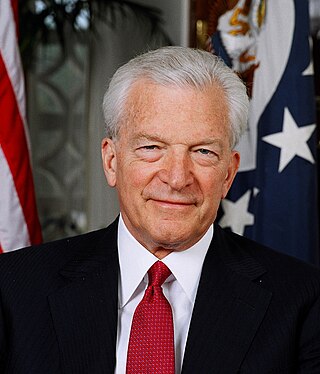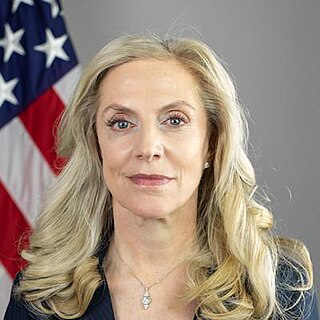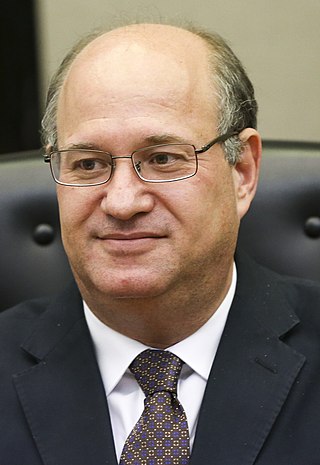Related Research Articles

The International Monetary Fund (IMF) is a major financial agency of the United Nations, and an international financial institution funded by 190 member countries, with headquarters in Washington, D.C. It is regarded as the global lender of last resort to national governments, and a leading supporter of exchange-rate stability. Its stated mission is "working to foster global monetary cooperation, secure financial stability, facilitate international trade, promote high employment and sustainable economic growth, and reduce poverty around the world." Established on December 27, 1945 at the Bretton Woods Conference, primarily according to the ideas of Harry Dexter White and John Maynard Keynes, it started with 29 member countries and the goal of reconstructing the international monetary system after World War II. It now plays a central role in the management of balance of payments difficulties and international financial crises. Through a quota system, countries contribute funds to a pool from which countries can borrow if they experience balance of payments problems. As of 2016, the fund had SDR 477 billion.
John Harold Williamson was a British-born economist who coined the term Washington Consensus. He served as a senior fellow at the Peterson Institute for International Economics from 1981 until his retirement in 2012. During that time, he was the project director for the United Nations High-Level Panel on Financing for Development in 2001. He was also on leave as chief economist for South Asia at the World Bank during 1996–99, adviser to the International Monetary Fund from 1972 to 1974, and an economic consultant to the UK Treasury from 1968 to 1970. He was also an economics professor at Pontifícia Universidade Católica do Rio de Janeiro (1978–81), University of Warwick (1970–77), Massachusetts Institute of Technology, University of York (1963–68) and Princeton University (1962–63).

Marek Marian Belka is a Polish professor of economics and politician who has served as Prime Minister of Poland and Finance Minister of Poland in two governments. He is a former Director of the International Monetary Fund's (IMF) European Department and former Head of Narodowy Bank Polski. He has served as a Member of the European Parliament (MEP) since July 2019.

The G20 or Group of 20 is an intergovernmental forum comprising 19 sovereign countries, the European Union (EU), and the African Union (AU). It works to address major issues related to the global economy, such as international financial stability, climate change mitigation and sustainable development.

David Campbell Mulford is an American diplomat who served as the United States Ambassador to India from February 23, 2004 to January 15, 2009, and served as Vice-Chairman International of Credit Suisse from 2009 to 2016. He is currently a distinguished visiting fellow at the Hoover Institution, focusing on research, writing, and activities related to global economic integration, including the legal and political environments of trade agreements and their management. He also concentrates his efforts on economic growth in the Indian subcontinent and the trend of receding globalization in developed economies.

Mark Alan Weisbrot is an American economist and columnist. He is co-director with Dean Baker of the Center for Economic and Policy Research (CEPR) in Washington, D.C. Weisbrot is President of Just Foreign Policy, a non-governmental organization dedicated to reforming United States foreign policy.

Agustín Guillermo Carstens Carstens is a Mexican economist who has served as the general manager of the Bank for International Settlements since 1 December 2017. He served as governor of the Bank of Mexico from 1 January 2010 to 30 November 2017. In 2011, Carstens, along with Christine Lagarde, was one of the two final candidates to become the managing director of the International Monetary Fund. He previously served as secretary of finance in the cabinet of Felipe Calderón (2006–09), as deputy managing director of the International Monetary Fund (2003–06) and as treasurer of the Bank of Mexico. In 2011 he was included in the 50 Most Influential ranking of Bloomberg Markets Magazine. Carstens took up his appointment as the general manager at the Bank for International Settlements in Basel, Switzerland, where he was appointed to a five-year term, starting on 1 December 2017.

Lael Brainard is an American economist serving as the 14th director of the National Economic Council since February 21, 2023. She previously served as the 22nd vice chair of the Federal Reserve between May 2022 and February 2023. Prior to her term as vice chair, Brainard served as a member of the Federal Reserve Board of Governors, taking office in 2014. Before her appointment to the Federal Reserve, she served as the under secretary of the treasury for international affairs from 2010 to 2013.

Ngaire Tui Woods CBE is the founding dean of the Blavatnik School of Government and professor of Global Economic Governance at the University of Oxford, formerly a professor at Harvard University. She founded the Global Economic Governance Programme and is the co-founder of the Oxford–Princeton Global Leaders Fellowship programme.

Eswar Shanker Prasad is an Indian-American economist. He is the Tolani Senior Professor of International Trade Policy at Cornell University and a senior fellow at the Brookings Institution, where he holds the New Century Chair in Economics.
William Richard Cline is an American economist and a Senior Fellow at the Peterson Institute for International Economics.

The pre-salt layer is a diachronous series of geological formations on the continental shelves of extensional basins formed after the break-up of Gondwana, characterised by the deposition of thick layers of evaporites, mostly salt. Some of the petroleum that was generated from sediments in the pre-salt layer has not migrated upward to the post-salt layers above due to salt domes. This is especially common off the coast of Africa and Brazil. Total pre-salt oil reserves are thought to be a significant fraction of the world's oil reserves. According to Brazilian oil and gas company Petrobras, the oil and natural gas reserves lie below an approximately 2,000 metres (6,600 ft) thick layer of salt, which in turn is beneath more than 2,000 metres (6,600 ft) of post-salt sediments in places, which in turn is under water depths between 2,000 and 3,000 metres in the South Atlantic. Because of this, drilling through the rock and salt to extract the pre-salt oil and gas is very expensive.
Domenico Lombardi is a former director of the Global Economy program at the Centre for International Governance Innovation (CIGI), a non-partisan global governance think tank in Waterloo, Ontario, Canada. He is also chair of the Oxford Institute for Economic Policy. Until 2013 he was a senior fellow at the Brookings Institution.
The R20 – Regions of Climate Action is a non-profit environmental organization founded in September 2011, by former governor of California, Arnold Schwarzenegger, with the support of the United Nations. R20 is a coalition of sub-national governments, private companies, international organizations, NGOs, and academic & financial institutions. Its mission is to accelerate sub-national infrastructure investments in the green economy to meaningfully contribute to the Sustainable Development Goals (SDGs). The NGO operates at the sub-national level as R20 believes sub-national governments constitute a powerful force for change and are best positioned to take action & implement green projects.
Reza Moghadam is a British-Iranian economist who has been Vice-Chairman for Global Capital Markets at Morgan Stanley since October 2014. Until July 2014, he was the International Monetary Fund’s front man for dealing with European policy makers and institutions during the eurozone crisis. During his twenty-year career at the IMF he dealt first-hand with many crises—in emerging markets, in the advanced countries of the Eurozone and with the Fund’s own restructuring.

Ramin Toloui is an American academic, civil servant, and financial advisor who serves as Assistant Secretary of State for Economic and Business Affairs in the Biden Administration.
Otaviano Canuto dos Santos Filho is a Brazilian economist. He is the executive director at the executive board of directors of the World Bank Group and its affiliates, the same position he held from 2004 to 2007. He previously served as executive director at the Board of the International Monetary Fund (IMF) for Brazil, Cabo Verde, Dominican Republic, Ecuador, Guyana, Haiti, Nicaragua, Panama, Suriname, Timor Leste and Trinidad and Tobago, as vice-president and Head of the Poverty Reduction and Economic Management (PREM) and as Senior Adviser on BRICS Economies at The World Bank, and as the State Secretary for International Affairs at the Ministry of Finance of Brazil.

Ilan Goldfajn is a Brazilian economist, former governor of the Central Bank of Brazil and former director of the International Monetary Fund's Western Hemisphere Department. In December 2022, he became president of the Inter-American Development Bank.

Geoffrey William Seiji Okamoto is an American economist and government official who served as first deputy managing director of the International Monetary Fund. Okamoto previously served as the acting assistant secretary for international finance and development in the United States Department of the Treasury. He was nominated for this position on January 1, 2019, by the White House and was never confirmed by the United States Congress. He previously served as acting assistant secretary for international markets and investment, for which he was also not confirmed.

Alice Chamberlayne Hill is an American policy-maker, thought leader, and academic. She currently serves as the David M. Rubinstein senior fellow for energy and the environment at the Council on Foreign Relations. She previously served as a fellow at Stanford University's Hoover Institution. During the Obama administration, she was Special Assistant to the President and Senior Director for Resilience Policy at the National Security Council, leading development of policy regarding national security and climate change, building climate resilience considerations and capabilities into international development and other federal initiatives, and developing national risk-management standards for damaging natural hazards. Prior, she served as Senior Counselor to the Secretary of the Department of Homeland Security, as a federal prosecutor, and judge and supervising judge within the Los Angeles Superior Court.
References
- ↑ Building a Resilient Tomorrow at Amazon.com
- ↑ Climate-Related Market Risk Subcommittee
- ↑ Martinez-Diaz's expert page at the Brookings Institution Archived 2008-07-20 at the Wayback Machine
- ↑ Partnership for the Americas Commission Archived 2008-09-07 at the Wayback Machine
- ↑ Globalizing in Hard Times at Amazon.com